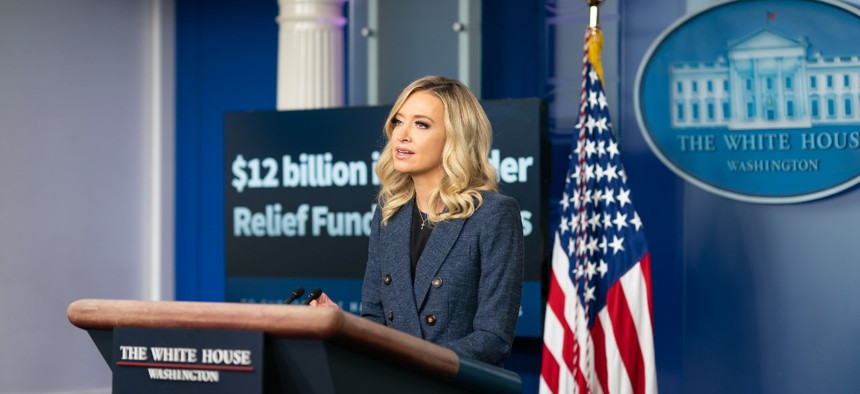
White House Press Secretary Kayleigh McEnany addresses reporters May 12. Official White House Photo by Andrea Hanks
Watchdogs Criticize Trump Administration's Deregulation Efforts During Pandemic
Meanwhile, the administration says the red tape rollback is central to boosting coronavirus testing and economic revival.
While many government watchdog groups have long been critical of the Trump administration's aggressive war on regulations, they have grown increasingly worried about regulatory rollbacks during the coronavirus pandemic.
Since President Trump took office in January 2017, deregulation has been one of his top priorities. The COVID-19 pandemic may have distracted public attention, but it has not slowed the administration’s efforts. In fact, White House officials have cited the need for speed and efficiency in responding to the pandemic as a key driver of deregulation.
“As the nation reels from a global health crisis that has killed over 80,000, infected over 1.3 million and touched the lives of everyone else, the Trump administration is all too often focused on other issues that have nothing to do with the crisis at hand,” the nonpartisan watchdog Accountable.US noted in a statement. “This push has taken many different forms, including deregulating or repealing common sense rules that protect consumers or moving forward with new rulemaking that benefits special interests with close ties to the administration.”
The group issued a report on Wednesday describing deregulatory actions that occurred from February 11 to May 8, including the weakening of fuel economy and greenhouse gas emissions standards, changes to how colleges must handle sexual assault investigations, and a “relentless atmosphere” of deregulation at the Interior Department. “In an administration that has a reputation for using red herrings to distract from what is really happening behind the scenes, far reaching measures are being enacted with little or no public debate, while the general public’s eyes are averted in the midst of a crisis,” said the report.
Other watchdog groups and experts have also called out the administration for its end run around long-standing federal regulations.
Last month The Washington Post reported that the administration was planning a sweeping deregulatory effort to boost the economy, which “could affect environmental policy, labor policy, workplace safety and health care, among other areas.”
Robert Weissman, president of Public Citizen, a consumer advocacy nonprofit watchdog criticized the potential move. “The deregulatory measures the administration has already taken during the pandemic—rolling back a smog rule, gutting the clean cars fuel economy rule (the most important U.S. climate change program), effectively waiving enforcement of environmental rules—have done far too much damage already,” he said.
Joel Mintz, Environmental Protection Network member and former EPA Enforcement and Supervisory Attorney, wrote on April 7 “effective pollution controls are a critical legal and moral responsibility of industrial enterprises, as well as government institutions, which is “all the more true in the midst of a serious national health crisis.”
Also, the Homeland Security Department has continued to waive certain regulations to speed up construction for the Southwest border wall. Lawmakers and public health and environmental experts have been calling on the administration to temporarily suspend construction to save taxpayer funds and protect the public’s health.
Meanwhile, the Trump administration has championed its deregulation efforts to speed up vaccine development and procure supplies, minimize face-to-face interactions at agencies and allow the Veterans Affairs Department to rehire retired experts to aid coronavirus efforts.
During a briefing on May 8, White House Press Secretary Kayleigh McEnany said, “Going forward … principles like deregulation, principles like lowering taxes—the president has mentioned a payroll tax pause” will be “entertained” to revive the economy.
Sally Katzen, an NYU Law School professor and former administrator of the Office of Information and Regulatory Affairs during the Clinton administration, told NBC News in April that it’s important to strike a balance between protecting people and slashing red tape.
“There should be a willingness to cut some of the regulatory requirements, but you don't want to threaten health and safety in the name of promoting health and safety,” she said. “There isn't a magic formula for how much you can relax requirements without crossing the line. You want people who are making decisions based on science.”







